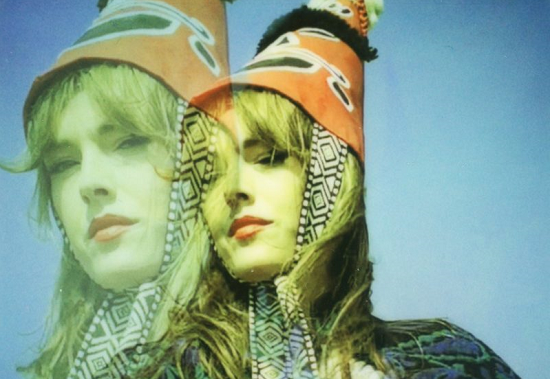Photo by Claire Marie Bailey
So many of Gwenno’s musical influences are rooted outside of recorded music. From being in a Socialist street choir to being an Irish dancer – records make up only one facet of her expe-rience. She riffs, with easy glamour, on music’s myriad uses – as a tool for activism, as a shared experience, as a solitary comfort, but also, as art for art’s sake. Indeed, Gwenno’s Baker’s Dozen touches all of these bases. But what features steadfastly is the work of personal heroes that cue moments of existential resonance and gentle confirmation, which make her go “Oh yeah, I know myself. That’s me.”
For Gwenno, the musical experience is as much about the medium as it is the message. Though it’s not necessarily the medium of sound or analogue recording that we’re talking about here. We’re talking about language as a medium. More specifically, Cornish and Welsh, through which she writes, reads, thinks, and lives.
“Languages have character, and particular uses that really feed into the imagination, and his seemed like something I needed to pursue further,” she muses, when we turn to the subject of her latest album, Tresor.
An experience of Tresor benefits from acknowledging where it sits in relation to her 2018 album, Le Kov. Le Kov was expressed through the medium of Cornish, but was written in Cardiff, “as a tribute to everything that I’d been taught and had been passed down, despite not necessarily having my own Cornish experience, apart from home life.” As an album, it was made “to get to know Cornwall and the community better – it was a link to the place and to the people.”
Tresor, however, is an emotional response to time spent in St Ives, in January 2020. Though visiting “as a tourist, essentially,” Tresor confirms Gwenno’s ties to the place. As part of the creative process, Gwenno recalls being conscious of not wanting to “project any lived experience of Cornwall” onto the album — a potential challenge that turned out to be “really addictive”.
Another challenge, Gwenno notes, relates to the concern of translating the fullness and truth of human experience, emotion, and atmosphere, as tied to a particular place. “As a musician you use music as your form. And this is always the challenge with language – to convey emo-tion, the language that every human understands.” So, what would it be like to make an album that feels like a week in St Ives? “For the most part,“ Gwenno concludes, “it’s a document of a week in St Ives with all of the spirits of St Ives. It’s about saying ‘I AM HERE, I am committed to this’, it’s not flippant, or about moving on to the next thing.’
Welsh and Cornish have both been crucial “tools for accessing pure imagination,” akin to drawing upon childhood experience, “the time when the imagination is at its most active.” Yet despite finding her native Brythonic languages to be comforting, it is clear that drawing upon childhood tongues is no retreat. Instead, in continuing to write through Welsh and Cornish, Gwenno emphasises the importance of growing through the language, exploring womanhood, and motherhood.
After coming across a poem written in the early 20th century by Phoebe Proctor, the Cornish language poet, Gwenno was struck by “the really intimate day to day experience,” and the way in which Proctor conveyed this experience with such emotion. Proctor’s work opened up questions around would it be like to explore desire, or domesticity, through Cornish — “As an introverted person, as most musicians are, it’s a way of exploring all of these ideas without feeling self-conscious about it because it will take people a while to understand it.”
Thus, the medium is a perfect mediator between sensuality, freedom of thought, and recep-tion. Tresor can tap immediately, lyrically, into desires, fantasies cosmopolitan aspira-tions, whilst operating sonically on the scale of place, space, and time. Indeed, each of these subjects crop up throughout her Baker’s Dozen.
Working in a similar, rhizomatic way, Tresor opens portals to other times, other plac-es, other referents and atmospheres. It is an emotional response to the people she’s met, the conversation’s she’s had, but it is also a treasure and a commitment to a community, and the polymorphic facets of Cornish identity. It is proof that life is lived through language, and thus, language is malleable, able to mutate and accommodate the domestic, the gigantic, the minu-tiae, and the universal too.
Gwenno’s new album Tresor is out on July 1 via Heavenly. To begin reading her Baker’s Dozen, click the portrait below


